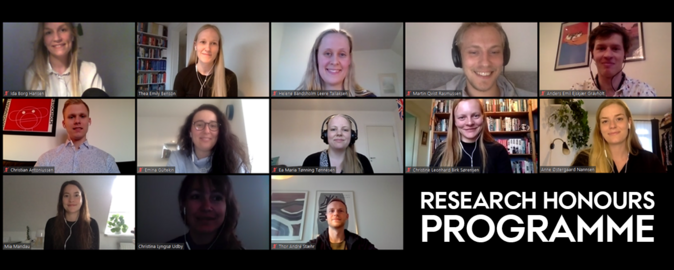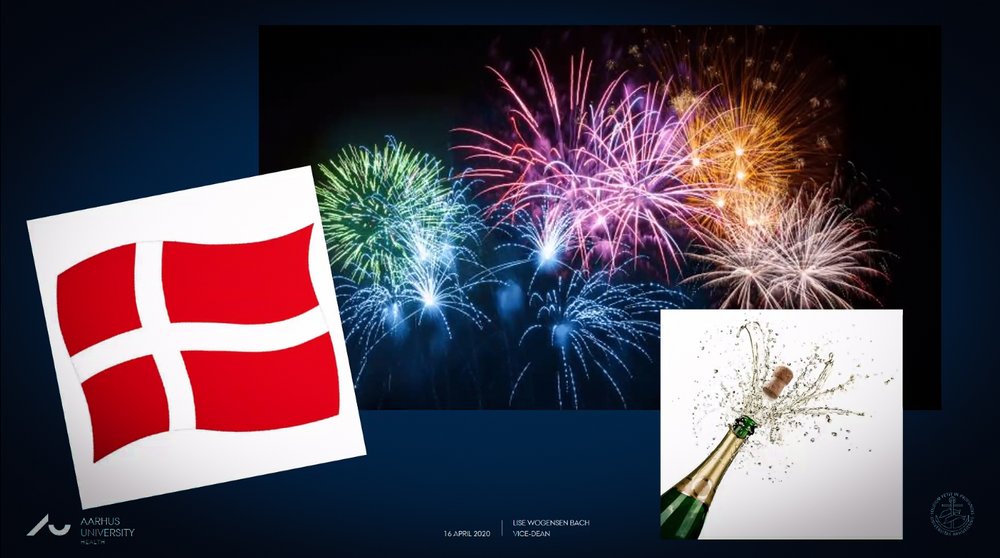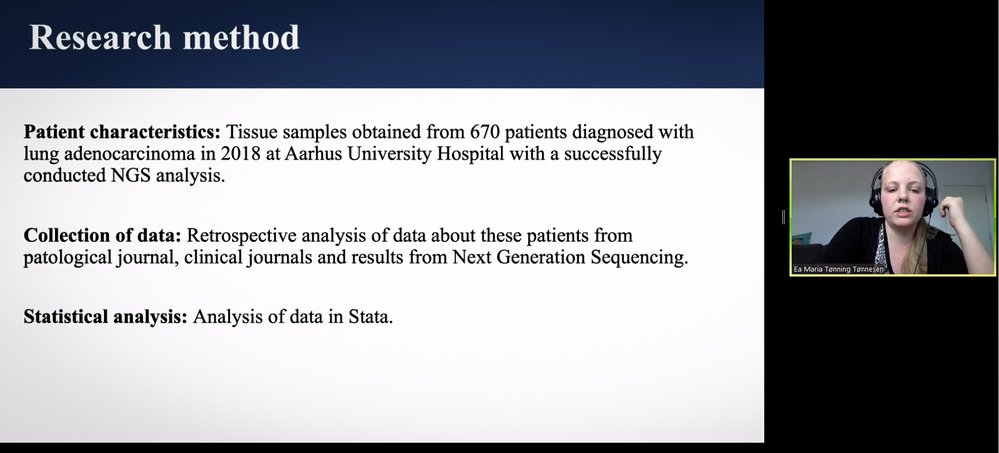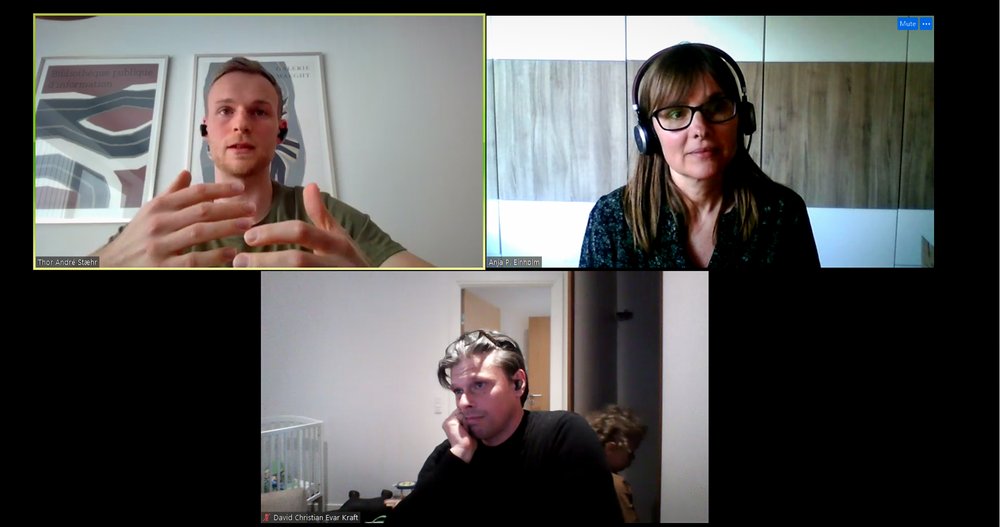- Education
-
Research
Current research
Talent
-
Collaboration
Businesses
Government agencies and institutions
Alumni
-
About AU
Organisation
Job at AU
While there were no canapés in the Richard Mortensen Stuen, at least Zoom was on its best behaviour as the 13 students from the Research Honours Programme marked the end of their two-year introduction to life as a researcher. And here the academic presentations were supplemented with both virtual champagne and a small, fair-haired interloper.
2020.04.30 |

A class of students have completed the research-oriented honours programme for only the second time in the faculty’s history. On 16 April, 13 talented students graduated in a virtual event on Zoom. Photo: Simon Byrial Fischel.
It’s a quarter to four. People are starting to log in. They are small talking while they wait as someone asks, “How’s it going with the Master's thesis?", and receives the reply, "I've had to tone down my expectations - everything is shut down now.” Someone else adds a little despondently: "The only thing that’s really happened since the corona outbreak is that I’ve lost all my test subjects. This can ruin a career."
More than 35 people are now gathered. In addition to the 13 honours programme participants, the Zoom channel also includes supervisors, teaching staff, a coordinator, a vice-dean and, of course, an IT supporter. Course coordinator Anja Einholm is helping people settle in to the channel:
"If you mute your microphone, you can unmute by pressing the spacebar," she says, "and now I’d like to ask you all to turn off your cameras so that only the presenter is visible."
It will shortly be four o’clock, and the 13 honours students will begin presenting the results of the academic work they have spent the past two years on devising, planning and carrying out – that is, in addition to their normal studies.
PowerPoint fireworks and champagne
The Vice-dean for Education Lise Wogensen Bach is the first to speak and she welcomes everybody to the graduation ceremony. She shares her screen with the other participants showing the first slide in a PowerPoint presentation.

She begins by saying: "Unfortunately, this isn’t the festive event we’d imagined, but that doesn’t mean there won’t be fireworks and champagne."
The graduation ceremony should have taken place in the Richard Mortensen Stuen. The canapés had already been ordered. However, like all the other events under the auspices of Aarhus University, it had to be cancelled. Around two weeks before the big day, it was decided that the event should still be held. The students who are concurrently doing their Master's theses should have the opportunity to wrap up the programme.
"Do you remember how beautiful our campus is?" asks Lise Wogensen Bach rhetorically before assuring the participants that there will be a proper reception once everyone is allowed to return to the university buildings.
Her opening speech revolves around the very essence of the honours programme – which is to provide the participants with an interdisciplinary introduction to the world of research.
"Doing research is completely different to being taught. It has to be driven by your own curiosity, your own questions," she says. And there is certainly no shortage of curiosity among the 13 students. They have worked meticulously on research projects on everything from lung cancer to how to diagnose death by drowning.
Each honour student has ten minutes allocated for their presentation, and they have been practicing this. Or at least something similar. The class has not only followed a wide range of workshops on various fields of research, they have also been trained in transferable skills – skills that can be transferred to other areas than the core tasks of research – including presentation techniques.
But can these skills also be transferred to a presentation where you cannot actually see your audience? The answer comes when the first participant begins. Her microphone works. As does her camera. Screen sharing takes over and Ea Tønnesen’s slides appear on the audience's screens. The 35 pairs of shoulders relax. Mercifully everything works, and the first presentations are held without any technical issues and with good opportunities for academic concentration – at least for the audience.

On the other hand, being a speaker in cyberspace is not satisfactory. Or at least it is a strangely discombobulated experience to sit at home and talk to the little camera in your computer, says one of the graduates, Emina Gültekin after the event:
She recalls how the very first workshop on the honours programme was 'How to present', before continuing “It’s therefore a great shame that we’re having to do this virtually, where the situation just becomes more impersonal."
The Zoom presentation has increased her awareness of how dependent you are on the small discrete signals from the audience when you speak. "You lack the energy that comes from the interaction. Just a simple nod or a smile that signals that we understand each other."
Back in the virtual presentation room, it is now seven in the evening and everything is actually going very well. Nine presentations with subsequent questions have been held, but during the tenth presentation the thing that everyone feared – but at the same time almost expected – happens. The screen goes black. The connection to Christine Leonhard Birk Sørensen disappears in the middle of her presentation.
”Christine? Are you there?" asks the coordinator. Initially there is no reply, but then the connection returns again. "Can You hear me?" Fortunately, we can. And after five weeks of virtual meetings, we have grown accustomed to this kind of thing.
Neither is there much surprise when during the questions, an uninvited guest suddenly appears behind the person asking the question, Associate Professor David Christian Evar Force. A small figure with fair, curly hair wanders in behind David and rummages in a cupboard.

The coordinator suppresses a little laugh. The speaker keeps his cool and answers the question. The show must go on.
As eight o’clock rolls by, the final speaker finishes. The 13 students receive congratulations and can now look forward to an exam diploma with a special distinction. However, for many of them, the project does not end here. Several of the participants have utilised the programme to prepare protocols which will form the basis for PhD applications – and some of them have even landed a scholarship.
Martin Qvist Rasmussen, who applied for and received a fully funded Master’s PhD at the Department of Biomedicine, is one of them.
"The work I’ve done on the honours programme means that I’ve been able to apply for an Integrated PhD with a very well-defined and 'mature' project,” he says after the graduation ceremony.
"I've also received a travel grant from the Danish Cancer Society, which makes it possible for me and my girlfriend to move to Boston for a year, where I will learn some completely new techniques at Harvard Medical School, which is at the forefront of my field."
Now only 13 students remain on the Zoom channel. They find something to fill a glass for a toast. A beer, a glass of wine, a soft drink. The atmosphere becomes more relaxed and more like the everyday life they have had together for the past two years. They cannot meet and there are no hugs, high-fives or touching of glasses, but that does not stop them. They all join a virtual guessing game and the evening carries on for a while longer.
Watch two of the graduates explain what they will take away from the Research Honours Programme.
The graduation ceremony for the Research Honours Programme was held on Thursday 16 April.
The 13 graduates are: Ea Tønnesen, Martin Qvist Rasmussen, Mia Mandau, Anne Oe. Nannsen, Christian Antoniussen, Christina Lyngsø Udby, Thor André Stæhr, Emina Gültekin, Anders Gravholt, Christine Leonhard Birk Sørensen, Thea Benson, Helene Bandsholm Leere Tallaksen and Ida Borg Hansen.
Research Programme Coordinator Anja P. Einholm
Department of Clinical Medicine
Email: ape@clin.au.dk
Tel.: (+45) 9350 8408